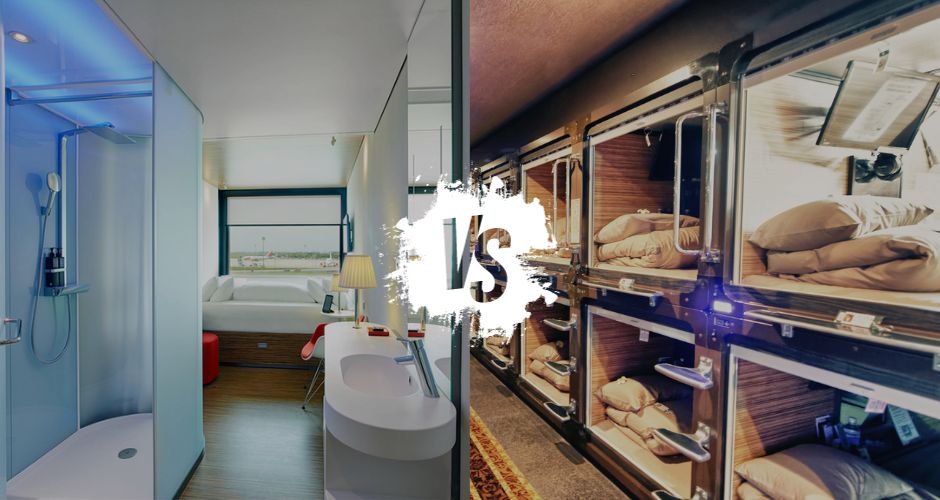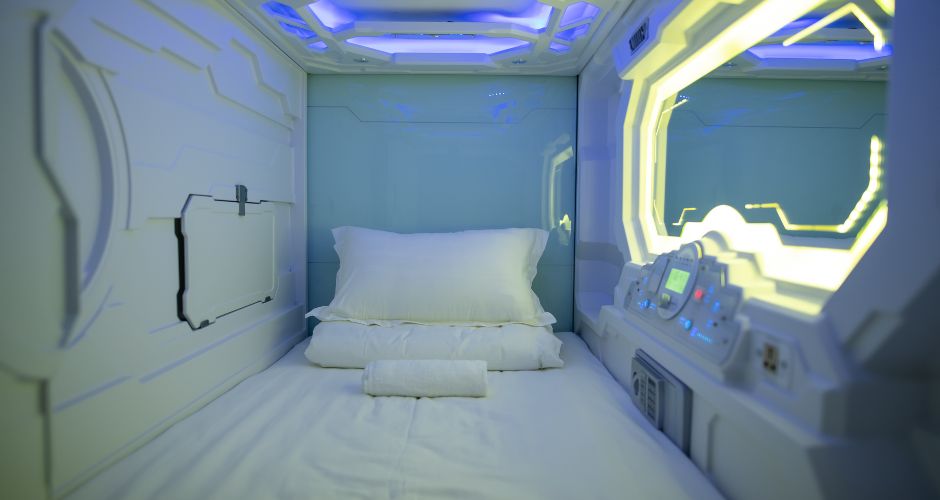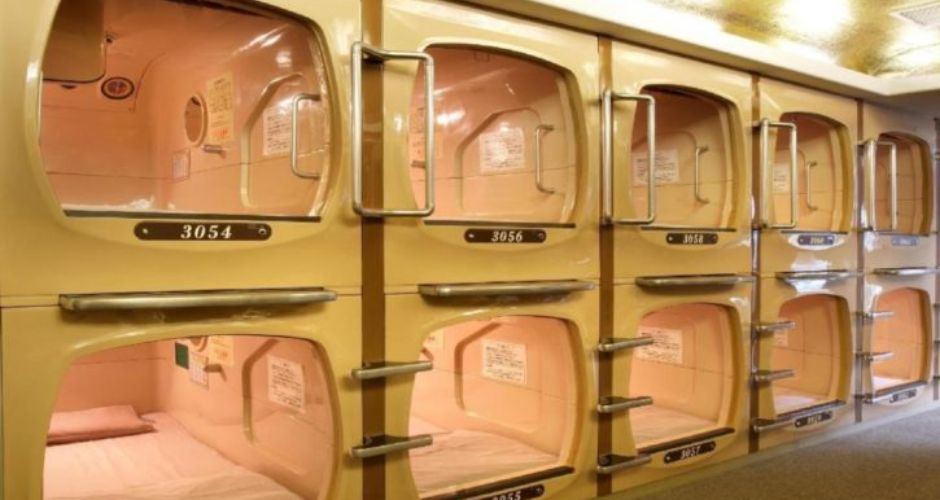Micro Hotels vs. Capsule Hotels: Which one is Better

In the ever-evolving landscape of travel accommodations, two intriguing possibilities have attracted the attention of modern-day explorers: Micro Hotels and Capsule Hotels. One important question you may find yourself considering as you organize your next trip is which one best fits your interests and manner of travel.
Come along on an investigation as we examine the key differences between Micro Hotels and Capsule Hotels and reveal the special experiences that each has to offer.
Whether you’re looking for the minimalist charm of pod-like lodgings or the efficiency of small quarters, this comparison will hopefully point you in the direction of the best option for your next trip. So which hotel will win the battle between Micro Hotels and Capsule Hotels? Together, let’s find the answers.
Micro Hotels
Micro hotels are a contemporary approach to lodging that focuses on providing compact yet well-designed spaces for travelers. These accommodations prioritize efficiency, smart design, and functionality, offering a minimalist stay with essential amenities in a reduced footprint.

| Pros | Cons |
| Cost-Effective: | Limited Space: |
| Micro hotels often provide a budget-friendly option for travelers, making them an attractive choice for those looking to save on accommodation costs. | The primary drawback is the limited space within the rooms. Travelers who prefer more spacious accommodations may find the compact nature of micro hotels confining. |
| Efficient Use of Space: | Minimal Amenities: |
| The small room sizes in micro hotels are meticulously designed to maximize functionality. Smart storage solutions and multi-purpose furniture contribute to an efficient use of space. | While micro hotels provide essential amenities, the range may be limited compared to larger hotels. Guests might miss features such as fitness centers, extensive dining options, or expansive lounges. |
| Central Locations: | Less Privacy: |
| Many micro hotels are strategically located in the heart of urban centers, offering convenient access to attractions, public transportation, and dining options. | The open layout and minimalist design may compromise privacy, as some micro hotels opt for glass or translucent partitions, reducing the separation between the sleeping and bathroom areas. |
| Tech-Driven Experience: | Not Ideal for Longer Stays: |
| Micro hotels often incorporate technology to enhance the guest experience, such as smart room controls, keyless entry systems, and in-room entertainment options. | Micro hotels are often designed for short stays, making them less suitable for travelers planning extended visits or those who prioritize spaciousness and a variety of amenities. |
| Social Spaces: | Potential Noise: |
| To compensate for smaller room sizes, micro hotels often prioritize communal areas, creating social hubs where guests can interact, work, or relax. | Due to the communal nature of micro hotels, noise levels can be higher, especially in shared spaces. This may impact guests seeking a quieter or more private atmosphere. |
| Environmental Considerations: | Limited Customization: |
| The compact nature of micro hotels often results in reduced energy consumption and a smaller environmental footprint compared to larger accommodations. | Guests accustomed to personalized and customizable experiences might find the standardized design and compact layout of micro hotels less appealing. |
Capsule Hotels
Capsule hotels are a specific type of lodging that originated in Japan. They feature individual sleeping pods or capsules, typically arranged in a modular grid, providing compact and efficient accommodations. Capsule hotels are known for their minimalist design and functional use of space.

| Pros | Cons |
| Efficient Use of Space: | Limited Privacy: |
| Capsule hotels are renowned for their efficient layout, maximizing the use of limited space. The modular design allows for a high density of sleeping spaces in a relatively small area. | The small size of the capsules and the open design of some capsule hotels may compromise privacy. While individual capsules typically have curtains or doors, the overall communal nature may not suit those seeking complete seclusion. |
| Affordability: | Compact Sleeping Spaces: |
| Capsule hotels often offer budget-friendly accommodation options, making them attractive to travelers seeking cost-effective stays. The minimalist design contributes to lower overall costs. | Capsule beds are compact, providing only enough space for a bed and minimal storage. This may be less appealing to travelers who prefer more spacious and traditional accommodations. |
| Central Locations: | Minimalist Amenities: |
| Many capsule hotels are strategically located in urban centers or near transportation hubs, providing convenient access to city attractions and public transportation. | Capsule hotels often focus on providing the essentials, and as a result, the range of amenities may be limited compared to larger hotels. Guests may miss features like spacious lounges, fitness centers, or on-site dining. |
| Quick Check-In/Check-Out: | Not Ideal for Extended Stays: |
| The streamlined design of capsule hotels facilitates quick check-in and check-out processes. Guests can experience a hassle-free stay with minimal administrative procedures. | The compact nature of capsule hotels makes them more suitable for short stays. Extended stays may be challenging due to the limited space and lack of traditional amenities. |
| Unique and Modern Design: | Potential Noise Levels: |
| Capsule hotels offer a unique and modern design that appeals to travelers seeking innovative and unconventional lodging experiences. The futuristic look of the capsules adds an element of novelty. | The communal aspect of capsule hotels can result in higher noise levels, especially in shared areas. Guests looking for a quiet and serene environment may find this aspect challenging. |
Micro Hotels vs. Capsule Hotels
As travellers seek unique and efficient lodging options, micro hotels and capsule hotels have emerged as popular choices, each offering a distinctive experience.
| Micro Hotels | Capsule Hotels |
| 1. Room Design: | |
| Micro hotels typically feature small but complete rooms, optimizing the use of space with smart design and multifunctional furniture. These rooms often include private bathrooms and amenities, providing a more conventional hotel experience in a compact setting. | Capsule hotels focus on ultra-compact sleeping spaces, known as capsules or pods. These capsules are often stacked or arranged in a modular grid, providing a minimalistic approach with shared facilities like bathrooms and communal areas. |
| 2. Size and Layout: | |
| Micro hotels offer a variety of room sizes but maintain a standard hotel layout with private rooms. The emphasis is on efficiency and smart design, allowing guests a more traditional stay in a smaller space. | Capsule hotels prioritize a smaller footprint, with individual sleeping pods being the primary feature. The layout is often open, resembling a dormitory-style setup with shared spaces for amenities. |
| 3. Amenities: | |
| Micro hotels provide a range of amenities similar to conventional hotels, including private bathrooms, in-room entertainment, and sometimes even fitness facilities. The emphasis is on offering a comfortable stay within a reduced space. | Capsule hotels focus on providing essential amenities, with an emphasis on communal areas. Shared bathrooms, lounges, and workspaces are common, fostering a social atmosphere among guests. |
| 4. Target Audience: | |
| Micro hotels often cater to a diverse range of travelers, including those seeking budget-friendly options, business travelers, and tourists looking for efficient city stays without compromising comfort. | Capsule hotels are often favored by budget-conscious travelers, solo adventurers, and those intrigued by the minimalist and communal aspects of the experience. |
| 5. Privacy and Seclusion: | |
| Micro hotels prioritize individual privacy with private rooms and enclosed spaces. The design aims to offer a more secluded and intimate environment. | Capsule hotels provide privacy within the individual sleeping pods, but the overall setup is more communal. Guests seeking a higher level of seclusion may find the open layout less accommodating. |
| 6. Global Presence: | |
| Micro hotels have a global presence, with various chains and independent establishments in different countries, adapting the concept to local preferences. | While originating in Japan, capsule hotels have expanded globally, with variations in design and execution. They often maintain an association with Japanese minimalist aesthetics. |
In conclusion, both micro hotels and capsule hotels offer innovative solutions for efficient and unique lodging experiences. The choice between them depends on individual preferences, with micro hotels providing a more conventional stay in a compact space and capsule hotels offering a minimalist and communal approach focused on the essentials.





